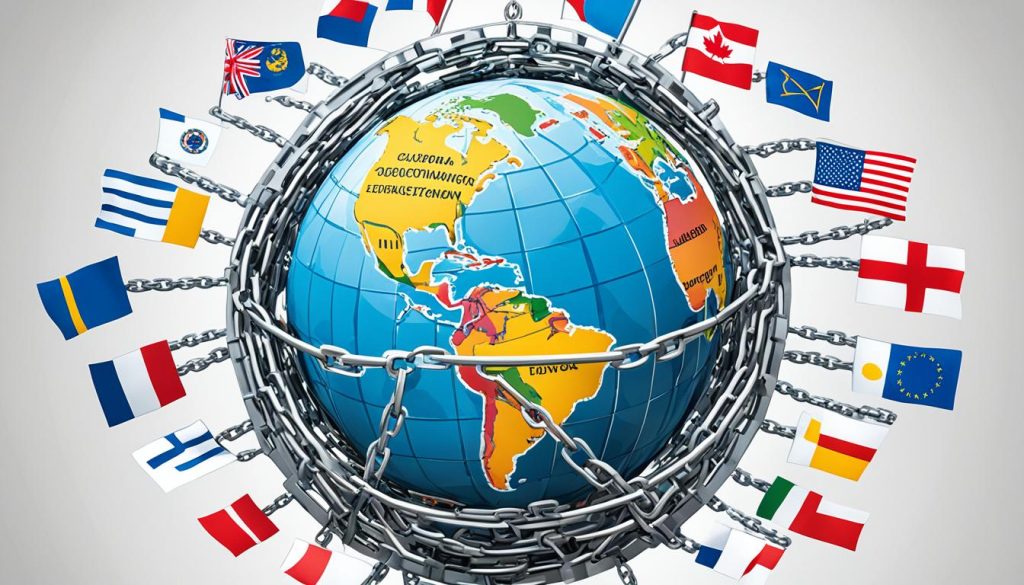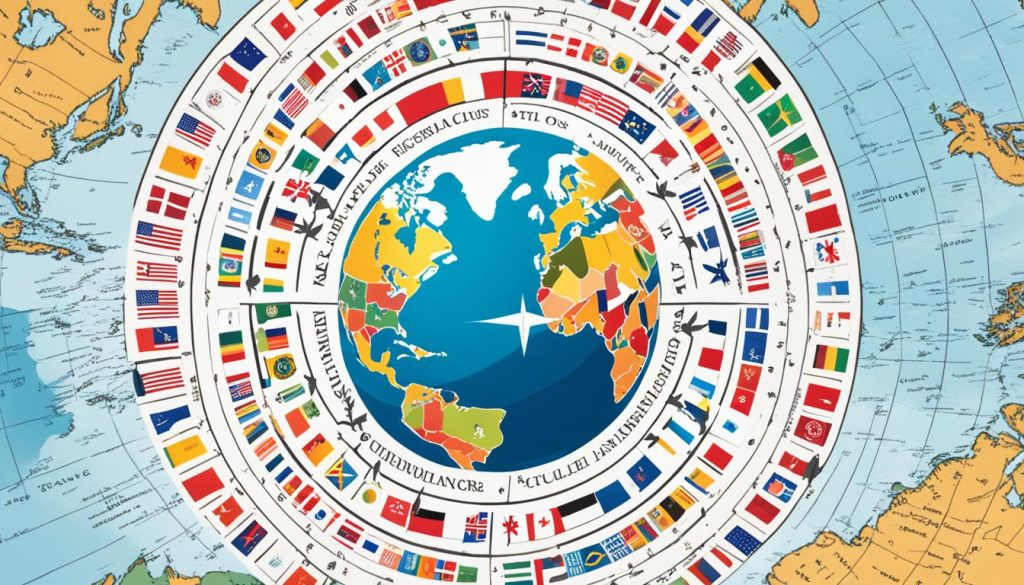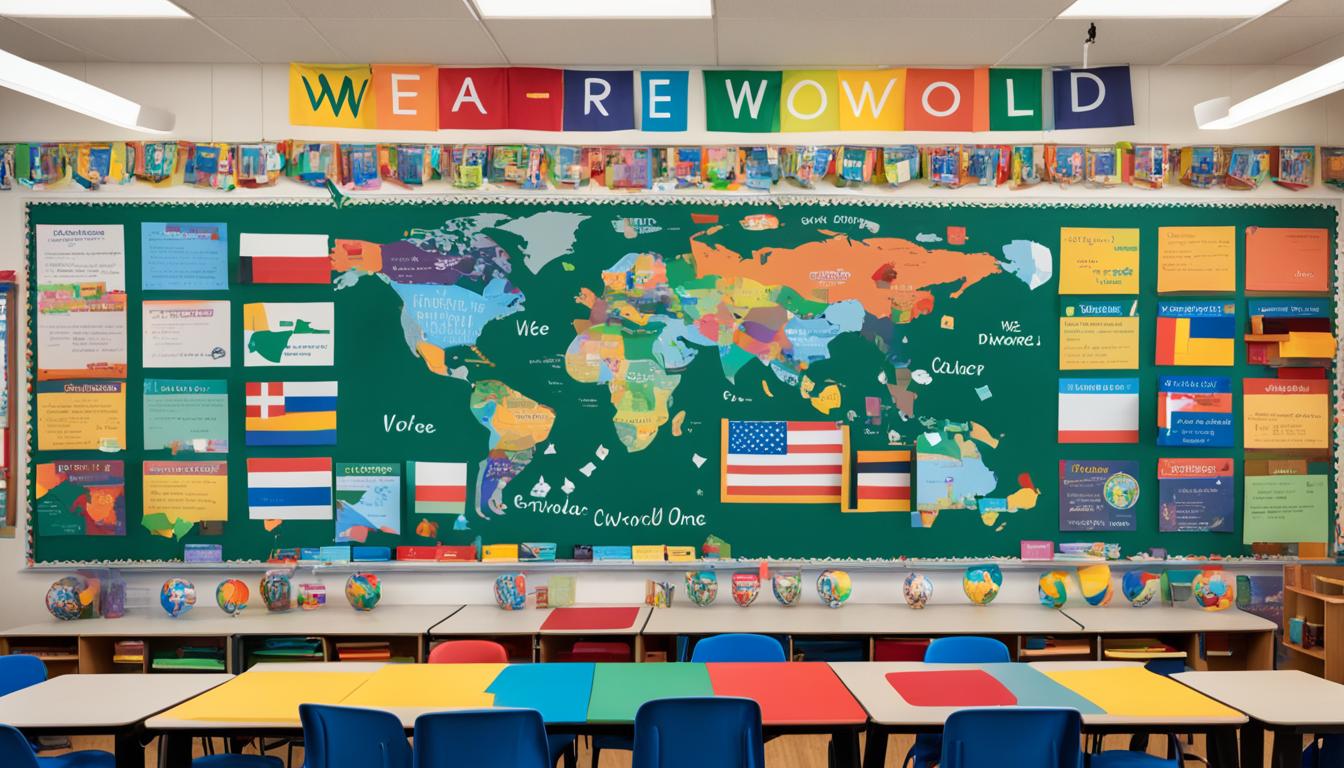In an era witnessing a remarkable surge in students seeking international education, the Ministry of Education notes a staggering 68% increase in Indian students pursuing education abroad. The role of a compelling student portfolio cannot be overstated, as it goes beyond a mere checklist to vividly paint one’s identity, achievements, and aspirations for admission committees. International education is essential to U.S. success in today’s global economy and geopolitical climate, and the United States must increase its efforts to attract and retain the world’s best and brightest, as well as ensure domestic students have access to opportunities that keep them competitive and equipped to collaborate across borders. A coordinated federal commitment to international education will ensure the United States has the talent pool necessary to innovate and engage with the world.
Key Takeaways
- The surge in international education, with a 68% increase in Indian students pursuing education abroad, highlights the importance of a compelling student portfolio.
- International education is essential for the U.S. to succeed in the global economy and geopolitical climate, requiring increased efforts to attract and retain global talent.
- Coordinated federal commitment to international education is crucial to ensure the U.S. has the necessary talent pool to innovate and engage with the world.
- Developing cross-cultural competence and fostering international collaboration are key components of a successful global education program.
- Promoting global citizenship and providing access to study abroad opportunities are essential for preparing students to thrive in the interconnected world.
Tailoring Your Student Portfolio for Global Success
Crafting a compelling student portfolio is essential for success in the global education landscape. To captivate admissions committees, you must first understand their ideal candidate profile, desired qualities, and expectations. Aligning your portfolio with their vision showcases your genuine interest, dedication, and fit for their institution.
Understanding Your Audience: Admissions Committees
Grasping the admissions committee’s perspective is foundational. Explore the university’s website, program details, and any available admissions guidelines to gain insights into their priorities. By aligning your portfolio with their specific criteria, you demonstrate a genuine understanding of the institution and your suitability as a candidate.
Showcasing Academic Prowess: Transcripts and Awards
Your academic journey forms the cornerstone of your portfolio. Include your transcripts, test scores, and any certificates or diplomas earned to exhibit your capabilities and commitment to academic excellence. Spotlight any honors, awards, or scholarships received to provide a comprehensive view of your academic prowess.
Embracing Well-Roundedness: Extracurriculars and Leadership
Universities highly value well-rounded individuals who have diverse experiences and perspectives. Showcase your involvement in cultural societies, sports, community service, and leadership roles to illustrate how these experiences have shaped your skills, personality, and global outlook.
Personal Statement: Your Unique Canvas
The personal statement is your opportunity to craft a compelling narrative that sets you apart. Reflect on your motivations for studying abroad, aligning your goals with the university’s program and outlining how you plan to contribute to its community. Weave in your unique experiences, passions, and aspirations to create a vivid portrait of who you are.
Letters of Recommendation: External Validation
Secure strong letters of recommendation that offer an external perspective on your character and abilities. Choose individuals, such as teachers, mentors, or community leaders, who can attest to your academic and personal qualities, providing valuable insights that complement your self-presentation.
Partnering with Educational Organizations
In the pursuit of a transformative global education, school leaders, teachers, and parents emerge as instrumental allies. As the demographics shift, educators are presented with a unique opportunity to tap into diversity as a strength. World Savvy, a leading organization spearheading this transformation across the nation, emphasizes the significance of collaboration with school administrators and educators.
Collaboration with School Leaders and Teachers
World Savvy encourages the development of global competencies, supporting the deep work of understanding where educators are, where they aspire to be, and how they can best achieve their goals in creating inclusive, adaptive, and future-ready classrooms. The organization provides materials, feedback, and a framework for inquiry-based learning to help educators execute their objectives in fostering global citizenship, cross-cultural competence, and international collaboration.
Engaging Parents as Allies
Recognizing the crucial role of parents in shaping the educational landscape, World Savvy emphasizes the importance of engaging them as allies in the global education transformation. By cultivating strong partnerships with families, educators can leverage the diversity of perspectives and experiences to enhance multicultural education and promote study abroad opportunities for students.
Tapping into Diversity as a Strength
In an increasingly diverse educational landscape, World Savvy encourages educators to view diversity and inclusion as a strategic advantage. By fostering multilingual education and intercultural communication skills, schools can empower students to become global citizens who are equipped to navigate the international collaborations and digital learning platforms essential for success in the 21st century.

Professional Development for Educators
To create classrooms that foster global competencies, World Savvy emphasizes the importance of providing comprehensive professional development experiences for educators. These experiences focus on equipping teachers with the necessary frameworks and tools to navigate the evolving educational landscape and better prepare students for the interconnected world.
Inquiry-Based Learning Framework
At the heart of World Savvy’s approach is an inquiry-based learning framework that encourages educators to engage in deep self-reflection. This framework guides teachers in understanding where they currently stand, where they aspire to be, and how they can best navigate the path to creating inclusive, adaptive, and future-ready classrooms. By fostering this introspective process, educators are empowered to develop global competencies and implement innovative teaching strategies.
World Problems and 21st Century Skills
World Savvy’s professional development programs prioritize addressing real-world problems and equipping educators with the skills to help students thrive in the 21st century. These programs move beyond the traditional focus on college-preparatory skills, instead emphasizing the development of critical thinking, collaboration, and global awareness – competencies that are often more relevant to students’ immediate concerns and the challenges they will face in the interconnected world.
Creating Inclusive and Adaptive Classrooms
Recognizing the diverse nature of modern classrooms, World Savvy’s professional development initiatives guide educators in creating inclusive and adaptive learning environments. By fostering an understanding of cultural differences, intercultural communication skills, and trauma-sensitive practices, teachers are better equipped to support the unique needs of their students and cultivate a sense of belonging. This approach ensures that all learners can engage meaningfully and contribute to the global dialogue.
Fostering Global Competencies
In today’s interconnected world, developing global competencies has become paramount for students to thrive as engaged world citizens and community members. World Savvy, a leading organization in this transformation, emphasizes the importance of cultivating social-emotional learning, trauma-sensitive practices, and building empathy and relationships as critical components of global competence.
Social-Emotional Learning
Global competence encompasses not just academic knowledge, but also the social-emotional skills that enable individuals to navigate diverse cultural contexts and engage effectively with people from different backgrounds. This includes self-awareness, self-management, social awareness, relationship skills, and responsible decision-making – all of which are essential for students to develop as they prepare to collaborate and lead in the international arena.
Trauma-Sensitive Practices
In an increasingly complex and fast-paced world, trauma-sensitive practices are crucial for supporting students’ overall well-being and resilience. By incorporating trauma-informed approaches, educators can create learning environments that are attuned to the diverse experiences and needs of their multicultural classrooms, fostering a sense of safety, trust, and belonging that empowers students to thrive.
Building Empathy and Relationships
At the heart of global competence lies the ability to connect with and understand others, regardless of their cultural, linguistic, or socioeconomic backgrounds. By cultivating empathy and fostering meaningful relationships, students develop the intercultural communication skills and emotional intelligence needed to navigate the challenges and opportunities of our interconnected world. This focus on relationship-building is central to World Savvy’s approach to global education.

Education for a Global World
As the world becomes increasingly interconnected, education must evolve to prepare students for the global landscape. World Savvy, an organization spearheading this transformation, emphasizes the critical importance of promoting global citizenship and equipping students with the skills to navigate complex problem-solving in the 21st century.
Promoting Global Citizenship
World Savvy recognizes that fostering global competencies is essential for students to become engaged and aware world citizens. By partnering with educators, the organization supports the development of classrooms that cultivate a deep understanding of diverse cultures, cross-cultural competence, and a sense of responsibility towards the global community.
Equipping Students for Complex Problem-Solving
In an increasingly interconnected world, students must be prepared to tackle multifaceted challenges that transcend borders. World Savvy’s educational approach focuses on developing critical thinking, creative problem-solving, and collaborative skills that enable students to address the complex issues facing our global society.
Encouraging Community Engagement and Action
Beyond the classroom, World Savvy emphasizes the importance of community engagement and action. By fostering opportunities for students to engage with local and global communities, the organization helps cultivate a sense of social responsibility and a commitment to making a positive impact on the world.
The transformation of education to meet the demands of the global world is crucial for preparing the next generation of leaders, innovators, and engaged citizens. By partnering with organizations like World Savvy, educators can create learning environments that nurture global competencies, international collaboration, and a deep understanding of the sustainable development goals.
International Student Mobility
Increasing international student mobility is essential for the United States to succeed in the global economy and geopolitical climate. As the world becomes increasingly interconnected, the ability to attract and retain the world’s best and brightest talent is crucial for the U.S. to maintain its position as a leader in innovation and collaboration.
Attracting and Retaining Global Talent
To remain globally competitive, the United States must prioritize efforts to attract and retain international students and scholars. This includes streamlining the visa process, providing competitive funding and scholarship opportunities, and fostering welcoming campus environments that celebrate diversity and inclusion. By tapping into the diverse perspectives and expertise of global talent, the U.S. can strengthen its position as a hub for international collaboration and world languages.
Increasing Study Abroad Opportunities
Ensuring domestic students have access to study abroad programs is equally important. These transformative experiences equip students with the cross-cultural competence and global citizenship skills necessary to thrive in the 21st-century workforce. By prioritizing study abroad initiatives and digital learning platforms that facilitate virtual exchange, the U.S. can empower students to become multicultural and intercultural communicators.
Facilitating Collaborative Research and Faculty Exchange
A coordinated federal commitment to international education will ensure the United States has the talent pool necessary to innovate and engage with the world. This includes facilitating collaborative research and faculty exchange programs that foster the exchange of ideas and best practices across borders. By strengthening these international partnerships and aligning with the Sustainable Development Goals, the U.S. can position itself as a global leader in education for a global world.
Internationalized Curricula
As the world becomes increasingly interconnected, the development of internationalized curricula has become a crucial component of a successful global education program. The U.S. Departments of State and Education have issued a Joint Statement of Principles to support these efforts, recognizing the transformative impact they can have on student preparation and engagement.
Foreign Language Instruction
Proficiency in world languages is a fundamental component of an internationalized curriculum. By offering robust foreign language instruction, educational institutions can empower students to communicate effectively across cultures and collaborate with their international partners. This multilingual competence not only enhances cross-cultural competence but also opens doors to study abroad opportunities and global citizenship.
Cross-Cultural Competence
Alongside language skills, the development of cross-cultural competence is essential for thriving in the multicultural classrooms and diverse communities of the 21st century. Curricula that incorporate intercultural communication skills, diversity and inclusion practices, and a deep understanding of global citizenship help students navigate the complexities of the interconnected world.
International Partnerships and Collaboration
Fostering international partnerships and collaboration is a hallmark of a truly internationalized curriculum. By establishing connections with educational institutions, research centers, and international organizations around the world, students gain access to global learning platforms, collaborative research projects, and study abroad programs that broaden their perspectives and prepare them for careers in the global economy.

Sustainable Development Goals
As the world faces pressing global challenges, the role of international education in supporting the United Nations’ Sustainable Development Goals has become increasingly crucial. The Department of Commerce’s 2023 National Export Strategy recognizes international education as a top U.S. export, underscoring its significance in addressing complex issues, promoting equity and inclusion, and fostering sustainable practices.
Addressing Global Challenges
Through cross-cultural competence and international collaboration, global education programs empower students to develop the skills and mindset needed to tackle the world’s most pressing challenges, such as climate change, poverty, and social injustice. By equipping learners with the ability to think critically and work together across borders, these programs play a vital role in advancing the Sustainable Development Goals and creating a more sustainable future.
Promoting Equity and Inclusion
Inclusive multicultural education and multilingual education programs foster a deeper understanding of diverse perspectives, cultures, and experiences. This approach promotes global citizenship and helps create more equitable and inclusive learning environments, where students from all backgrounds can thrive and contribute to the betterment of their communities and the world.
Fostering Sustainable Practices
Global education initiatives that align with the Sustainable Development Goals encourage students to develop sustainable mindsets and engage in sustainable practices. From promoting study abroad programs that minimize environmental impact to incorporating digital learning platforms that reduce resource consumption, these programs empower learners to become agents of positive change and stewards of the planet.

Digital Learning Platforms
The Department of Education’s “Raise the Bar: Create Pathways for Global Engagement” initiative highlights the importance of leveraging digital learning platforms to facilitate virtual exchange programs, online collaborative projects, and provide accessible global education resources. These innovative tools and initiatives are crucial for expanding access to international education and preparing students for the interconnected world of the 21st century.
Virtual Exchange Programs
Virtual exchange programs leverage technology to connect students from different countries and cultures, enabling them to collaborate on meaningful projects, share perspectives, and develop cross-cultural competence without the need for physical travel. These immersive digital learning experiences foster global citizenship and international collaboration, preparing students to thrive in the global marketplace.
Online Collaborative Projects
Harnessing the power of digital learning platforms, students can engage in online collaborative projects that tackle sustainable development goals and complex, real-world challenges. These initiatives cultivate critical thinking, problem-solving, and intercultural communication skills, equipping students with the necessary tools to address global issues and make a positive impact.
Accessible Global Education Resources
Digital learning platforms also provide a wealth of accessible global education resources, making high-quality international curriculum, world language instruction, and study abroad opportunities available to a wider audience. This democratization of global education ensures diversity and inclusion in the classroom, fostering multicultural understanding and preparing students for success in a multilingual, interconnected world.

International Curriculum Standards
As the world becomes increasingly interconnected, the development of a coordinated national strategy for international education must include the establishment of comprehensive curriculum standards that promote multicultural education, global competency frameworks, and the integration of diverse perspectives. These efforts will ensure students receive a well-rounded, globally-focused education that prepares them to thrive in the 21st century.
Multicultural Education
Curriculum standards should mandate the inclusion of diverse cultures, histories, and perspectives, empowering students to develop a deeper understanding and appreciation for the richness of global diversity. By exposing learners to multilingual education and international partnerships, they can cultivate the intercultural communication skills necessary to navigate an increasingly multicultural world.
Global Competency Frameworks
Alongside multicultural education, the integration of global competency frameworks into curriculum standards will equip students with the essential knowledge, skills, and mindsets to succeed in a global world. This includes fostering cross-cultural competence, international collaboration, and a strong sense of global citizenship.
Integrating Diverse Perspectives
To truly prepare students for the interconnected world, curriculum standards must mandate the integration of diverse perspectives across all subject areas. From study abroad opportunities to the exploration of sustainable development goals, learners will develop a nuanced understanding of global issues and their role as active participants in the international community.
Conclusion
In conclusion, a successful global education program requires a comprehensive approach that addresses the essential components outlined in this article. From tailoring your student portfolio for global success to partnering with educational organizations, providing professional development for educators, and fostering global competencies, the goal is to equip students with the skills and mindset to thrive in the interconnected world. By leveraging digital learning platforms, internationalized curricula, and aligning with the Sustainable Development Goals, educational institutions can create a transformative global education experience.
A coordinated national strategy for international education is crucial to ensure the United States remains globally competitive and continues to attract and retain the world’s best and brightest talent. By promoting cross-cultural competence, international collaboration, and global citizenship, educational institutions can empower students to become engaged, aware, and action-oriented global citizens, ready to tackle the complex challenges of the 21st century.
Ultimately, a comprehensive global education program that focuses on multicultural education, world languages, and study abroad opportunities will not only benefit individual students but also strengthen the nation’s position in the global economy and geopolitical climate. Investing in the development of digital learning platforms, sustainable development goals, and intercultural communication skills will ensure the United States remains at the forefront of international education.
FAQ
What are the essential components of a successful global education program?
How can I tailor my student portfolio for global success?
How can I partner with educational organizations to enhance my global education experience?
What types of professional development opportunities are available for educators to support global education?
Why is it important to develop global competencies in students?
How can education prepare students for the global world?
Why is increasing international student mobility important for the United States?
What initiatives are in place to support the development of internationalized curricula?
How do the Sustainable Development Goals relate to global education?
What role do digital learning platforms play in global education?
What are the key components of international curriculum standards?
Source Links
- https://worldsavvy.org/global-competence/
- https://www.linkedin.com/pulse/5-essential-components-building-successful-study-jai-khandelwal-jxj4f
- https://www.nafsa.org/establishing-national-strategy-international-education
